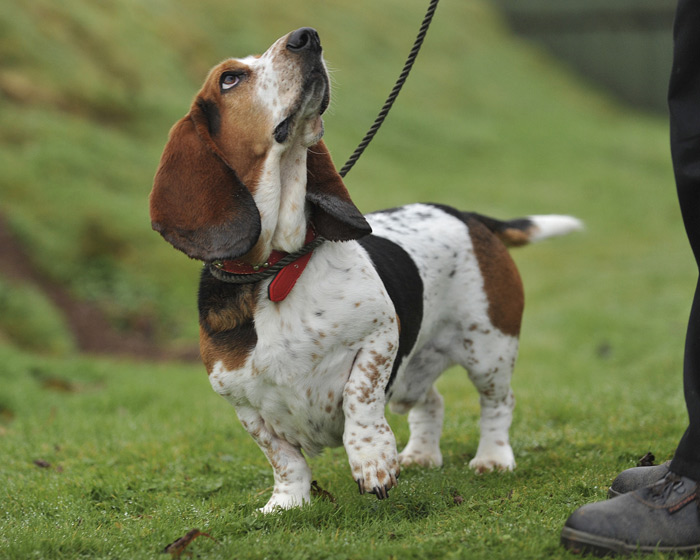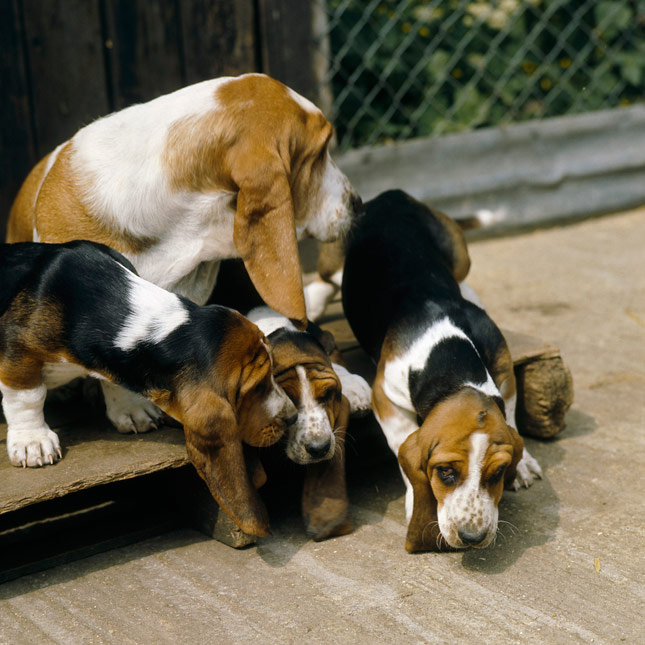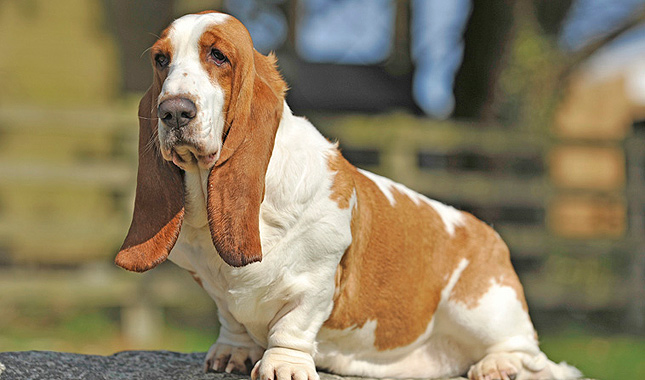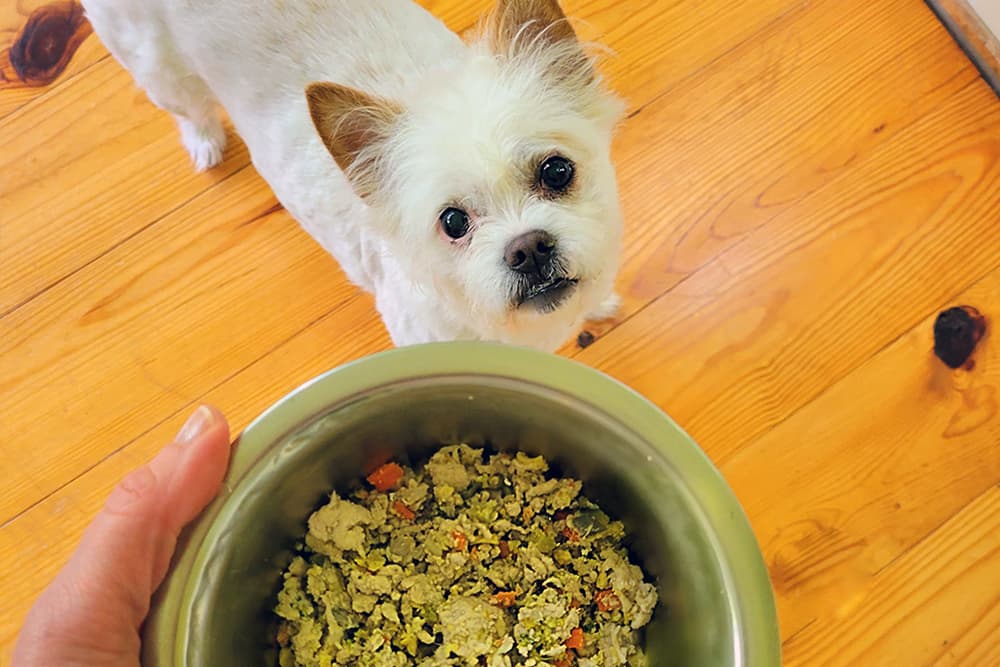Basset Hound
Published on June 21, 2011
Breed Details
- Height: No more than 14 inches
- Weight: 50 to 65 pounds
Breed Characteristics
Adaptability
Trainability
Grooming
Apartament Friendly
Child Friendly
Shedding Level
Dog Friendly
Exercise Needs
Territorial
Barking Tendencies
Health Issues
Social Needs
Energy Level
Affectionate
Watchdog Instincts
Cat Friendly
Intelligence
Stranger Friendly
The Basset is a good-natured hound with a pleading gaze that comes in handy when he wants a treat or knows he has broken the rules. Bassets have a reputation for being slow and lazy, but these hunting dogs enjoy long, rambling walks.The Basset Hound’s long ears and mournful eyes have so touched our hearts that he is once of those breeds almost as well-known for what he has sold — shoes and washing machines — as for his engaging personality. But those who love him know that behind his “hang dog” expression is the soul of a clown. And while most hounds may be a little too much dog for many people, his short legs slow him down and his easy-going disposition makes him a wonderful family companion. Just make sure you’re one of those people who thinks the classic hound howl is melodious, not cacophonous.
The Basset’s short-legged, long-backed silhouette is one of the most recognizable in the dog world, and he’s one of the most popular of the hounds. His special combination of stubbornness (manifested by selective deafness and an apparent ability to remain deeply asleep with a human being calling his name from four inches away) and sense of humor leaves his owners unsure of whether to be angry or just give up and laugh. Tip: laugh.
Most Basset Hounds come in some combination of white, tan or black, and have dark, expressive eyes, a wrinkled forehead, and long floppy ears. They are large dogs with short legs, weighing from 50 to 70 pounds. They need to be brushed every couple of days to keep the moderate shedding to a minimum. Keep their wrinkles, ears, and the area under their somewhat sagging eyes clean and dry.
The Basset is never really in a hurry to get anywhere, but his long-ago past as a hunting hound sometimes sends him off under fences and out open doors. He’s a poor choice for backyard life, as he’s deeply attached to his human family and will pine and mourn if banished outdoors. More to the point, he’ll howl, loud enough to be heard for miles around.
This sturdy hound loves children and is a wonderful playmate for them, though it’s always best to supervise kids and dogs. He’s also almost always wonderful with other dogs and with cats. In fact, it’s rare for a Basset Hound to have any serious temperament problems, as long as you don’t expect much in the way of obedience.
The Basset Hound’s long back is a weak area, so discourage him from jumping up on couches or on you. And watch his waistline; he can suffer from a number of health problems that will be made much worse by obesity. He loves his food and isn’t too proud to beg for it – or steal it. When he’s older, he might find even a single flight of stairs impossible to manage. Unless you can heft a dog who weighs between 50 and 70 pounds, think twice before bringing a Basset Hound into a home with stairs.
Other Quick Facts
- The Basset’s long ears serve a purpose: they sweep scent from the ground up toward his nose.
- Bassets need daily brushing because they shed constantly.
- Bassets have an oily coat that gives the dog a distinctive odor. It’s not something that can be bathed away or perfumed out of existence.
- Some Bassets slobber and drool.
All featured products are chosen at the discretion of the author. However, Vetstreet may make a small affiliate commission if you click through and make a purchase.
The History of Basset Hounds
The Basset descends from dogs developed at the 7th-century abbey of St. Hubert in the Ardennes forest, where Abbot Hubert — now the patron saint of hunters, archers and forest rangers — was fond of hunting. He spent much of his time developing a new strain of hound with powerful scenting ability. They became known as St. Hubert hounds and were prized throughout France and England. One line of the St. Hubert hounds became the Bloodhounds of today, but another line produced short-legged, slow-moving dogs that became the preferred dog of hunters on foot in search of small game. The packs drove rabbits and hare from dense brush into open ground, where they could be seen by the hunters.
Bassets first came to the United States in the early 19th century, and the American Kennel Club began registering them in 1885. Bassets became well known in the 1960s after starring in an ad campaign for Hush Puppy shoes, and their popularity increased dramatically. The breed currently ranks 36th in AKC registrations.
Basset Hound Temperament and Personality
The Basset is a good-natured clown with a definite sense of humor. He uses his pleading gaze to wheedle treats from anyone who can’t resist them — and that’s most people — as well as to get out of trouble when he has broken the rules — which is often.
Beneath that sleepy expression, Bassets are highly intelligent and they quickly learn to manipulate people using “helpless” body language and lots of tail wagging. Behaviors a Basset might use to cajole his people into letting him stay on the couch include rolling over on his back, moaning and making full use of his puppy-dog eyes.
As a pack dog, he’s full of team spirit. His motto is “The more the merrier,” and he enjoys the company of people, kids, other dogs and cats.
As a typical hound, he’s an independent thinker who is ruled by his nose. The drive to follow an interesting scent can lead the Basset into all kinds of trouble, sometimes fatal: into the path of a speeding car or far away from home. He must be contained by a securely fenced yard for his own safety.
Channel a Basset’s scenting ability by participating in tracking (following human scent), as well as Basset field trials and hunt tests (following rabbit scent). If nothing else, take him on a long, meandering walk every day to keep him happy and healthy. Remember that a Basset is built to hunt all day long, so you usually won’t wear him out.
The perfect Basset doesn’t come ready-made from the breeder. Any dog, no matter how nice, can develop obnoxious levels of barking, digging and other undesirable behaviors if he is bored, untrained or unsupervised.
Start training your puppy the day you bring him home. Even at eight weeks old, he is capable of soaking up everything you can teach him. Don’t wait until he is 6 months old to begin training or you will have a more headstrong dog to deal with. If possible, get him into puppy kindergarten class by the time he is 10 to 12 weeks old, and socialize, socialize, socialize. However, be aware that many puppy training classes require certain vaccines (like kennel cough) to be up to date, and many veterinarians recommend limited exposure to other dogs and public places until puppy vaccines (including rabies, distemper and parvovirus) have been completed. In lieu of formal training, you can begin training your puppy at home and socializing him among family and friends until puppy vaccines are completed.
Talk to the breeder, describe exactly what you’re looking for in a dog, and ask for assistance in selecting a puppy. Breeders see the puppies daily and can make uncannily accurate recommendations once they know something about your lifestyle and personality.
The ideal Basset doesn’t spring fully formed from the whelping box. He’s a product of his background and breeding. Whatever you want from a Basset, look for one whose parents have nice personalities and who has been well socialized from early puppyhood.
What You Need to Know About Basset Hound Health
All dogs have the potential to develop genetic health problems, just as all people have the potential to inherit a particular disease. Run, don’t walk, from any breeder who does not offer a health guarantee on puppies, who tells you that the breed is 100 percent healthy and has no known problems, or who tells you that her puppies are isolated from the main part of the household for health reasons. A reputable breeder will be honest and open about health problems in the breed and the incidence with which they occur in her lines.
The Basset can develop certain health problems, including glaucoma, thrombopathia, von Willebrand’s disease (a bleeding disorder), hypothyroidism, patellar luxation, elbow dysplasia and combined immunodeficiency, a condition that makes it difficult for the immune system to fight off infections. Bassets are also prone to skin infections, especially in the skin folds and paws. Here’s a brief rundown on what you should know.
Your puppy’s breeder should have written documentation from the Canine Eye Registry Foundation (CERF) that her dogs do not have an abnormality of the eyes that can result in glaucoma.
Dogs should also be genetically tested for thrombopathia through the Auburn University College of Veterinary Medicine, and have von Willebrand factor antigen testing, which can be done by most veterinarians. Both conditions are bleeding disorders that can occur in Basset Hounds.
Other important health clearances are documentation from the Orthopedic Foundation for Animals that the puppy’s parents have normal thyroid glands and that their hips and elbows are rated good or better. For hips, certification from PennHIP or the Institute for Genetic Disease Control (GDC) is also acceptable.
Basset Hounds can develop a spinal problem known as intervertebral disc disease (IVDD), which can affect any part of the Basset Hound’s spine including the neck. This condition makes even the smallest of movement painful and difficult and can require surgery. There are no tests for IVDD, but it is common in long-backed breeds.
The Basset Hound Club of America also recommends that breeders have puppies temperament-tested. The breeder should be able to show you American Temperament Test Society (TT) or Puppy Aptitude Testing (PAT) certification on her dogs.
Not all of these conditions are detectable in a growing puppy, and it is impossible to predict whether an animal will be free of these maladies, which is why you must find a reputable breeder who is committed to breeding the healthiest animals possible. They should be able to produce independent certification that the parents of the dog (and grandparents, etc.) have been screened for common defects and deemed healthy for breeding. That’s where health registries come in.
The Basset Hound Club of America participates in the Canine Health Information Center, a health database. Before individual Basset Hounds can be issued a CHIC number, breeders must submit eye test results from the Canine Eye Registration Foundation (CERF) and the results of a gonioscopy, a type of eye exam.
Breeders must agree to have all test results, positive or negative, published in the CHIC database. A dog need not receive good or even passing scores on the evaluations to obtain a CHIC number, so CHIC registration alone is not proof of soundness or absence of disease, but all test results are posted on the CHIC website and can be accessed by anyone who wants to check the health of a puppy’s parents. If the breeder tells you she doesn’t need to do those tests because she’s never had problems in her lines and her dogs have been “vet checked,” then you should go find a breeder who is more rigorous about genetic testing.
Careful breeders screen their breeding dogs for genetic disease and breed only the healthiest and best-looking specimens, but sometimes Mother Nature has other ideas and a puppy develops one of these diseases despite good breeding practices. Advances in veterinary medicine mean that in most cases the dogs can still live a good life. If you’re getting a puppy, ask the breeder about the ages of the dogs in her lines and what they died of.
Not every Basset visit to the vet is for a genetic problem. The Basset Hound’s long, floppy ears make the dogs prone to chronic ear infections. Left untreated, such infections can cause permanent damage to the ear canal and even destroy your dog’s hearing.
Bassets are more susceptible than other breeds to bloat, a condition in which the stomach expands with air. This can become a more serious condition, called gastric torsion, if the stomach twists on itself, cutting off blood flow. Gastric torsion, strikes suddenly, and a dog who was fine one minute can be dead a few hours later. Watch for symptoms like restlessness and pacing, drooling, pale gums and lip licking, trying to throw up but without bringing anything up, and signs of pain. Gastric torsion requires immediate veterinary surgery, and most dogs who have bloated once will bloat again. That means it’s wise to opt for the procedure known as “stomach tacking,” which will keep the stomach from twisting in the future. This procedure can also be done as a preventive measure.
The addition of a high-fiber probiotic to your Basset Hound’s diet is worth considering. Great Poop offers a total digestive support product in the form of a delectable chew. The all-in-one formula provides comprehensive gut health support and immune system for firm poops and more.
Remember that after you’ve taken a new puppy into your home, you have the power to protect him from one of the most common health problems: obesity. Keeping a Basset at an appropriate weight is one of the easiest ways to extend his life. Make the most of your preventive abilities to help ensure a healthier dog for life.
The Basics of Basset Grooming
The Basset has a short coat that requires daily care because it sheds heavily. Brush it with a rubber curry brush daily if you want to keep all the loose hair under control. The brush removes dead hairs that would otherwise end up on your floor, furniture and clothing.
The oily Basset coat gives the dog a “houndy” odor. Some people like it, some people loathe it. If you’re a loather, you can bathe your Basset weekly to reduce the smell, but it will never completely go away.
The rest is basic care. Trim his nails as needed, usually every few weeks, and brush his teeth for good overall health and fresh breath.
Finding a Basset Hound
Whether you want to go with a breeder or get your dog from a shelter or rescue, here are some things to keep in mind.
Choosing a Basset Breeder
Finding a good breeder is the key to finding the right puppy. A good breeder will match you with the right puppy, and will without question have done all the health certifications necessary to screen out health problems as much as is possible. He or she is more interested in placing pups in the right homes than in making big bucks.
Good breeders will welcome your questions about temperament, health clearances and what the dogs are like to live with and come right back at you with questions of their own about what you’re looking for in a dog and what kind of life you can provide for him. A good breeder can tell you about the history of the breed, explain why one puppy is considered pet quality while another is not, and discuss what health problems affect the breed and the steps she takes take to avoid those problems.
Start your search for a good breeder at the website of the Basset Hound Club of America, and locate a breeder who has agreed to abide by its code of conduct, which prohibits the sale of puppies to or through pet stores. Choose a breeder who is not only willing but insists on being a resource in helping you train and care for your new dog.
Pay close attention to your potential puppy’s temperament. While most Bassets do have good temperaments, a breeder who has American Temperament Test Society (TT) certification on her dogs is to be preferred over one who does not.
Avoid breeders who only seem interested in how quickly they can unload a puppy on you and whether your credit card will go through. Breeders who offer puppies at one price “with papers” and at a lower price “without papers” are unethical and should be reported to the American Kennel Club. You should also bear in mind that buying a puppy from websites that offer to ship your dog to you immediately can be a risky venture, as it leaves you no recourse if what you get isn’t exactly what you expected. Put at least as much effort into researching your puppy as you would into choosing a new car or expensive appliance. It will save you money in the long run.
Many reputable breeders have websites, so how can you tell who’s good and who’s not? Red flags include puppies always being available, multiple litters on the premises, having your choice of any puppy, and the ability to pay online with a credit card. Those things are convenient, but they are almost never associated with reputable breeders.
Whether you’re planning to get your new best friend from a breeder, a pet store, or another source, don’t forget that old adage “let the buyer beware”. Disreputable breeders and facilities that deal with puppy mills can be hard to distinguish from reliable operations. There’s no 100% guaranteed way to make sure you’ll never purchase a sick puppy, but researching the breed (so you know what to expect), checking out the facility (to identify unhealthy conditions or sick animals), and asking the right questions can reduce the chances of heading into a disastrous situation. And don’t forget to ask your veterinarian, who can often refer you to a reputable breeder, breed rescue organization, or other reliable source for healthy puppies.
The cost of a Basset puppy varies depending on the breeder’s locale, whether he is male or female, what titles his parents have, and whether he is best suited for the show ring or a pet home. The puppy you buy should have been raised in a clean home environment, from parents with health clearances and conformation (show) and, ideally, working titles to prove that they are good specimens of the breed. Puppies should be temperament tested, vetted, dewormed, and socialized to give them a healthy, confident start in life.
Put at least as much effort into researching your puppy as you would into choosing a new car or expensive appliance. It will save you money in the long run.
Before you decide to buy a puppy, consider whether an adult Basset might better suit your needs and lifestyle. Puppies are loads of fun, but they require a lot of time and effort before they grow up to become the dog of your dreams. An adult may already have some training and will probably be less active, destructive and demanding than a puppy. With an adult, you know more about what you’re getting in terms of personality and health and you can find adults through breeders or shelters. If you are interested in acquiring an older dog through breeders, ask them about purchasing a retired show dog or if they know of an adult dog who needs a new home. If you want to adopt a dog, read the advice below on how to do that.
Adopting a Dog from a Basset Rescue or Shelter
There are many great options available if you want to adopt a dog from an animal shelter or breed rescue organization. Here is how to get started.
1. Use the Web
Sites like Petfinder.com and Adopt-a-Pet.com can have you searching for a Basset in your area in no time flat. The site allows you to be very specific in your requests (housetraining status, for example) or very general (all the Bassets available on Petfinder across the country). AnimalShelter can help you find animal rescue groups in your area. Also some local newspapers have “pets looking for homes” sections you can review.
Social media is another great way to find a dog. Post on your Facebook page that you are looking for a specific breed so that your entire community can be your eyes and ears.
2. Reach Out to Local Experts
Start talking with all the pet pros in your area about your desire for a Basset. That includes vets, dog walkers, and groomers. When someone has to make the tough decision to give up a dog, that person will often ask her own trusted network for recommendations.
3. Talk to Breed Rescue
Networking can help you find a dog that may be the perfect companion for your family. You can also search online for other Basset rescues in your area. Most people who love Bassets love all Bassets. That’s why breed clubs have rescue organizations devoted to taking care of homeless dogs. The Basset Club of America’s rescue network can help you find a dog that may be the perfect companion for your family. You can also search online for other Basset rescues in your area.
The great thing about breed rescue groups is that they tend to be very upfront about any health conditions the dogs may have and are a valuable resource for advice. They also often offer fostering opportunities so, with training, you could bring a Basset home with you to see what the experience is like.
4. Key Questions to Ask
You now know the things to discuss with a breeder, but there are also questions you should discuss with shelter or rescue group staff or volunteers before you bring home a pup. These include:
What is his energy level?
How is he around other animals?
How does he respond to shelter workers, visitors and children?
What is his personality like?
What is his age?
Is he housetrained?
Has he ever bitten or hurt anyone that they know of?
Are there any known health issues?
Wherever you acquire your Basset, make sure you have a good contract with the seller, shelter or rescue group that spells out responsibilities on both sides. Petfinder offers an Adopters Bill of Rights that helps you understand what you can consider normal and appropriate when you get a dog from a shelter. In states with “puppy lemon laws,” be sure you and the person you get the dog from both understand your rights and recourses.
Puppy or adult, take your Basset to your veterinarian soon after adoption. Your veterinarian will be able to spot problems, and will work with you to set up a preventive regimen that will help you avoid many health issues.














